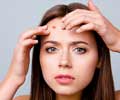While teen acne could be devastating, a key drug taken to treat it could add to one’s depression.
Developing acne at a very early age could prove a devastating experience, but could be fought back.
Compounding the problem is that a key drug taken to treat it, Roche’s roaccutane could add to one’s depression. In some cases, it could trigger suicidal tendencies.While no causal link had been established between the drug and either depression or suicide, it is constantly monitored, experts say.
Data gathered by the UK’s Medicines and Healthcare products Regulatory Agency show 27 young people have committed suicide in the country while taking roaccutane, although there is no proof that the drug is the cause.
Depressed about her teenage acne, Melissa Hewett started to self-harm and tried almost monthly to take her own life.
The acne, which covered much of her body, left her feeling worthless and miserable.
She spent time in a mental health clinic getting treatment for her depression.
Now Melissa’s acne has cleared and, at the age of 21, she is starting to live again and is engaged - but she feels acne robbed her of much of her youth.
Advertisement
"I developed at a young age, which meant my acne started young at about 11 to 12 years old.
Advertisement
Melissa was bullied at school and started to cut herself.
"I needed to release pain that was built up, I blamed my skin for causing the problems, so I took it out on my skin," she said.
"I felt it didn’t matter, as who would ever look at me anyway, except to mock me?"
Melissa tried everything to try to clear her skin, from over-the-counter remedies to prescription drugs, like roaccutane.
She was placed on the drug at 13 and she says she feels that combined with anti-depressants, which she was also taking, it triggered her slide from feeling miserable about her acne into a clinical depression.
"I was feeling low because of the acne, but will always think that the anti-depressants and roaccutane triggered me into an actual depression," she said.
"I felt suicidal, I self-harmed and began not just to feel ugly, but to hate myself.
"I felt worthless, that I wasn’t a good enough human. The treatment did help my skin though.
"But I started to cut myself and attempted suicide every month.
"Once the acne had gone I still found it very difficult to like myself as I had all the scars still from cutting.
"It took a few years and my wonderful fiancé to bring me back up from a very dark place."
Dr Alison Layton, consultant dermatologist for the British Skin Foundation, agreed that acne - even quite mild acne - can have devastating affects on self esteem.
"Although there is a spectrum and you can get very mild and very severe acne, the psychological impact can be quite immense even with quite minimal problems," she said.
"I think that the reason for that is that it hits young people at a time when they are undergoing the maximum change and wanting to look good.
"People with quite mild acne can get quite depressed by it and yet you can see people with quite severe acne cope quite well.
"The bottom line is that it has the potential to cause problems psychologically.
"The depression can be quite severe, causing suicide, and people can be very clinically depressed." A spokesman for Roche said: "Unfortunately, severe acne can cause some sufferers to become depressed and can also affect their mood and self esteem.
"This is why the information provided with roaccutane (isotretinoin) carries a warning that some patients may experience mood changes, including an increase in depression."
However, he added, over the past 20 years, more than 13 million people worldwide have been treated for severe acne using roaccutane.
Melissa, who is currently not taking medication, said acne needed to be taken more seriously.
This summer Melissa is taking part in the British Skin Foundation’s ’Walk for Skin’ to promote the desperate need for research and funding into acne and its effects, BBC reports.
Indy Rihal, from the foundation, feels the funds are urgently needed.
"Millions of people suffer from skin disease in the UK and more needs to be done to help," she said.
"The "Walk for Skin" raises money for vital research into all skin diseases, including acne.
"We can make a real difference to those people whose lives are blighted by skin disease and help to fund research into new treatments and eventually cures."
Source-Medindia
GPL/S











